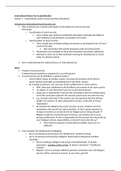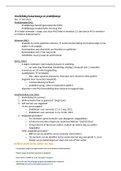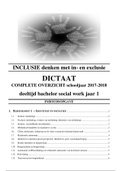International labour law & globalization
Lecture 7 – International social security law [Paul Schoukens]
Introduction International Social Security Law
Main emphasis put on general principles of international social security law
Main goals:
o Coordination of social security
Focus mainly upon general coordination principles underlying the bilateral
and multilateral (coordination) conventions in the field
o Harmonisation of social security
Focus mainly upon standard setting instruments as developed by the ILO and
council of Europe
(ILO convention 102 and the European code of social security).
Weaknesses and strengths of these harmonisation instruments addressed
Attempt to reach out to their potential meaning for development of social
policy in national systems
Don’t underestimate the national flavour in international law
Why?
Treaties of social security
& international institutions competent for social Protection
Is social security not by definition a national matter?
o French citizen moves to another country; he leaves his presence in the French
system behind and builds up something new in the other country
o By creating an absence, you may lose certain entitlements in some systems
Well, those lost entitlements will be filled up by systems in the new country
so, option only intervene if you are not protected abroad
giving you an opportunity to let you live somewhere else but continue living
in the first protection system if the second country does not solve this loss
e.g. moving to the USA the systems are not equal but the USA still has
health care systems when going back to France, is the USA or France
responsible?
By national law; Belgium law says if you give up your residence and live
somewhere else we will not export pensions don’t export pensions to
foreign ex-workers (so would do this for Belgian person living abroad)
Belgium would say if someone goes to France, you will lose out on your
pension entitlement who is responsible for this pension that they built up
now? Belgium refuses responsibility, so should France take this up?
Pure national response to international mobility cases are not
sufficient
Case example: the Netherlands and Belgium
o Key to accessing social security in the Netherlands: residence (living)
o key to accessing social security in Belgium: Based upon professional activities
(working)
Person working in Belgium and living in the Netherlands double
protection = positive conflict of law means 2 pensions? 2 healthcare
refunds?
Belgium: if you’re already entitled to pension somewhere else, the Belgium
pension will be reduced in amount pay twice, get half
, o Or
Person working in Netherlands, living in Belgium negative conflict of law
no system available, no protection
When European communion came into play as well; freedom movement of
workers, we have to enhance workers mobility. However, this will not work if
there’s different law systems that may conflict with one another.
o Mayor goal of social security law = to align ss, co-ordinate them so when people
move, they will not experience too much problems with accessing their social
security protections
We try to promote the fact that we should have labour and social protection; some countries namely
may not have it. What’s the problem with this? Why bother?
Especially after WWII, it’s been accepted that SS is a fundamental right. We assume it should
be developed globally worldwide, and that it should be promoted.
Philadelphia declaration makes reference to that as well, not as much as a human right but
still sincere
o Instead of workers fighting each other, workers should fight together to improve
(social) working conditions fight to have social peace.
Concept of harmonization wants to promote social protection wants to bring systems closer to
each other. Not unify them, but harmonize them; make sure that some fundamental protection is
being achieved; have a system and bring these systems more together, more alike
- Difficult because each culture has their own influences on their systems; difficult to try and
align these different systems; delicate discussion
Looking at SS from a positive side (to make sure organisations don’t abuse workers, to make sure all
systems are fair when organisations are competing with each other in an international market) is
refreshing, pretty new
→ study the treaties and institutions
Social security?
- Diversity of meanings
o It’s important to make sure everyone understands one another on the understanding
of social security; need a common definition for this
First mention by?
o ‘Simon Bolivar’
There’s a discussion going on; who launched the idea of social security?
(Spanish speaking people refer to Bolivar, whereas others will say Bismarck)
o 1935 “SS Act” in U.S.
Some say president Roosevelt was the first one who actually defined SS
- At the international level not one definition
- In the international area, however, the term social security is commonly used in a special
sense. It is understood to refer to the nine branches of social insurance listed in Convention
No. 102 (1952) of the I.L.O., defined the contingencies which suited this
o This convention is about setting standards in the field of SS
o Definition in very pragmatic way: i.e. those which provide medical care, sickness,
unemployment, old age, industrial injury and industrial illness, family, maternity,
invalidity and survivor’s benefits. In this sense, it does not normally include social
assistance
, One problem; they don’t make any refence to social assistance because in
1952 this wasn’t considered a real contingency, because it wasn’t regulated
by law (it was still charity in most countries)
- REGULATION EC N 883/2004 (already 16 years ago) refers to the same nine branches, but
they have to be understood in a broader sense. fall back on old definition of 1952 which
excludes social assistance strange because national definition states that social assistance
is included nowadays, but on international level it isn’t
So:
- In treaties and EC co-ordination:
o Social security = {soc. insurances}
≠
- In our language:
o soc. sec. = soc. ins.+ soc. ass.
The Most Important International Social Security Instruments for merit of structuring, not much
more
The sources of international social security law are to be found in instruments, which can
be classified according:
- Their nature
o Conventions of principle
o conventions of substance
- The framework in which they were concluded
o Who is making the conventions?
Bilateral conventions = 2 countries are involved in making it
Multilateral conventions = > 2 countries are involved in making it
Can take place at global level, international, or at more regional level
(UN vs Council of Europe)
- With regard to their objectives
o Either its coordination or its harmonisation
Some convention will be very hard to group (e.g. they both coordinate and harmonise a
watch is very co-ordinated, but the wheels need to have at least a little bit of harmony to fit
into each other when they turn, this is the same, it’s mostly co-ordination but has a little bit
of harmony to it as well)
According to their nature, a distinction is made between:
A. Instruments of principle
o Taking the form of instruments of fundamental law merely affirming the right to
social security as one of man’s social rights, e.g. (law all of us should have access to)
Within the framework of the UN the Universal Declaration of Human Rights
(1948) [however no Treaty!];
The International Covenant on Economic, Social and Cultural Rights (1966)
“Each human being as a member of society has a right on social
security” (Art. 22 General Declaration, art. 9 Covenant)
Within the Council of Europe
European Social Charter (article 12 right to social security; article 13
right to social assistance
In 1950’s ‘60’s ‘70’s a multitude of conventions were launched, addressing the fact that the right to
SS is a fundamental right, principle right, but not giving details on how this should be filled in; makes
sense because it’s a principle right. It’s a protective right; the idea is not to specify your health care or
pension, but simply stating that you have a right to a health care system or a pension.
Lecture 7 – International social security law [Paul Schoukens]
Introduction International Social Security Law
Main emphasis put on general principles of international social security law
Main goals:
o Coordination of social security
Focus mainly upon general coordination principles underlying the bilateral
and multilateral (coordination) conventions in the field
o Harmonisation of social security
Focus mainly upon standard setting instruments as developed by the ILO and
council of Europe
(ILO convention 102 and the European code of social security).
Weaknesses and strengths of these harmonisation instruments addressed
Attempt to reach out to their potential meaning for development of social
policy in national systems
Don’t underestimate the national flavour in international law
Why?
Treaties of social security
& international institutions competent for social Protection
Is social security not by definition a national matter?
o French citizen moves to another country; he leaves his presence in the French
system behind and builds up something new in the other country
o By creating an absence, you may lose certain entitlements in some systems
Well, those lost entitlements will be filled up by systems in the new country
so, option only intervene if you are not protected abroad
giving you an opportunity to let you live somewhere else but continue living
in the first protection system if the second country does not solve this loss
e.g. moving to the USA the systems are not equal but the USA still has
health care systems when going back to France, is the USA or France
responsible?
By national law; Belgium law says if you give up your residence and live
somewhere else we will not export pensions don’t export pensions to
foreign ex-workers (so would do this for Belgian person living abroad)
Belgium would say if someone goes to France, you will lose out on your
pension entitlement who is responsible for this pension that they built up
now? Belgium refuses responsibility, so should France take this up?
Pure national response to international mobility cases are not
sufficient
Case example: the Netherlands and Belgium
o Key to accessing social security in the Netherlands: residence (living)
o key to accessing social security in Belgium: Based upon professional activities
(working)
Person working in Belgium and living in the Netherlands double
protection = positive conflict of law means 2 pensions? 2 healthcare
refunds?
Belgium: if you’re already entitled to pension somewhere else, the Belgium
pension will be reduced in amount pay twice, get half
, o Or
Person working in Netherlands, living in Belgium negative conflict of law
no system available, no protection
When European communion came into play as well; freedom movement of
workers, we have to enhance workers mobility. However, this will not work if
there’s different law systems that may conflict with one another.
o Mayor goal of social security law = to align ss, co-ordinate them so when people
move, they will not experience too much problems with accessing their social
security protections
We try to promote the fact that we should have labour and social protection; some countries namely
may not have it. What’s the problem with this? Why bother?
Especially after WWII, it’s been accepted that SS is a fundamental right. We assume it should
be developed globally worldwide, and that it should be promoted.
Philadelphia declaration makes reference to that as well, not as much as a human right but
still sincere
o Instead of workers fighting each other, workers should fight together to improve
(social) working conditions fight to have social peace.
Concept of harmonization wants to promote social protection wants to bring systems closer to
each other. Not unify them, but harmonize them; make sure that some fundamental protection is
being achieved; have a system and bring these systems more together, more alike
- Difficult because each culture has their own influences on their systems; difficult to try and
align these different systems; delicate discussion
Looking at SS from a positive side (to make sure organisations don’t abuse workers, to make sure all
systems are fair when organisations are competing with each other in an international market) is
refreshing, pretty new
→ study the treaties and institutions
Social security?
- Diversity of meanings
o It’s important to make sure everyone understands one another on the understanding
of social security; need a common definition for this
First mention by?
o ‘Simon Bolivar’
There’s a discussion going on; who launched the idea of social security?
(Spanish speaking people refer to Bolivar, whereas others will say Bismarck)
o 1935 “SS Act” in U.S.
Some say president Roosevelt was the first one who actually defined SS
- At the international level not one definition
- In the international area, however, the term social security is commonly used in a special
sense. It is understood to refer to the nine branches of social insurance listed in Convention
No. 102 (1952) of the I.L.O., defined the contingencies which suited this
o This convention is about setting standards in the field of SS
o Definition in very pragmatic way: i.e. those which provide medical care, sickness,
unemployment, old age, industrial injury and industrial illness, family, maternity,
invalidity and survivor’s benefits. In this sense, it does not normally include social
assistance
, One problem; they don’t make any refence to social assistance because in
1952 this wasn’t considered a real contingency, because it wasn’t regulated
by law (it was still charity in most countries)
- REGULATION EC N 883/2004 (already 16 years ago) refers to the same nine branches, but
they have to be understood in a broader sense. fall back on old definition of 1952 which
excludes social assistance strange because national definition states that social assistance
is included nowadays, but on international level it isn’t
So:
- In treaties and EC co-ordination:
o Social security = {soc. insurances}
≠
- In our language:
o soc. sec. = soc. ins.+ soc. ass.
The Most Important International Social Security Instruments for merit of structuring, not much
more
The sources of international social security law are to be found in instruments, which can
be classified according:
- Their nature
o Conventions of principle
o conventions of substance
- The framework in which they were concluded
o Who is making the conventions?
Bilateral conventions = 2 countries are involved in making it
Multilateral conventions = > 2 countries are involved in making it
Can take place at global level, international, or at more regional level
(UN vs Council of Europe)
- With regard to their objectives
o Either its coordination or its harmonisation
Some convention will be very hard to group (e.g. they both coordinate and harmonise a
watch is very co-ordinated, but the wheels need to have at least a little bit of harmony to fit
into each other when they turn, this is the same, it’s mostly co-ordination but has a little bit
of harmony to it as well)
According to their nature, a distinction is made between:
A. Instruments of principle
o Taking the form of instruments of fundamental law merely affirming the right to
social security as one of man’s social rights, e.g. (law all of us should have access to)
Within the framework of the UN the Universal Declaration of Human Rights
(1948) [however no Treaty!];
The International Covenant on Economic, Social and Cultural Rights (1966)
“Each human being as a member of society has a right on social
security” (Art. 22 General Declaration, art. 9 Covenant)
Within the Council of Europe
European Social Charter (article 12 right to social security; article 13
right to social assistance
In 1950’s ‘60’s ‘70’s a multitude of conventions were launched, addressing the fact that the right to
SS is a fundamental right, principle right, but not giving details on how this should be filled in; makes
sense because it’s a principle right. It’s a protective right; the idea is not to specify your health care or
pension, but simply stating that you have a right to a health care system or a pension.










